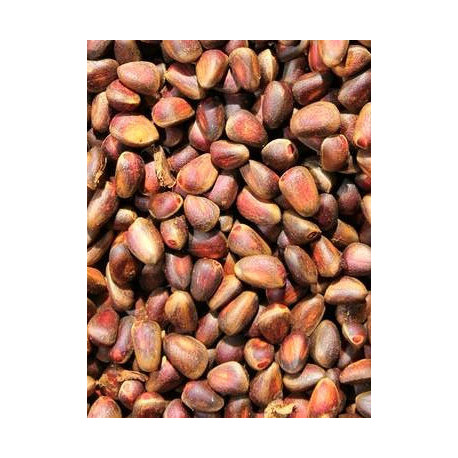



Reference: NOIXCEDRE1,8KG
Cedar nuts contain approximately 55% of valuable unsaturated fatty acids, particularly linoleic and alpha-linolenic acid, as well as the rare pinoleic/pinolenic acid. They are rich in tocopherols (vitamin E) as antioxidants and high-quality proteins (approx. 17%). They also contain numerous minerals (including magnesium, potassium, phosphorus), trace elements (copper, manganese, zinc), vitamins (K and B), and flavonoids.
For centuries, the inhabitants of Siberia have valued the widespread cedar (Pinus sibirica), a stone pine, not only as a source of precious wood but also for the tasty and extremely nutritious seeds that are trapped in the cedar cones.
Cedar nuts contain about 55% valuable unsaturated fatty acids, particularly linoleic and alpha-linolenic acid, as well as the rare pinoleic/pinolenic acid. They are rich in tocopherols (vitamin E) as antioxidants and high-quality proteins (approx. 17%). They also contain many minerals (notably magnesium, potassium, phosphorus), trace elements (copper, manganese, zinc), vitamins (K and B), and flavonoids.
Cedar nuts have a taste similar to other pine nuts but are a bit sweeter and stronger. Unlike almost all commercially available pine nuts, our raw cedar nuts are not heat-treated.
Rowan berry in dried fruit form, which hooked beaks, native birds, and tropical birds are fond of. Use it to enrich your seed mixes or as treats. Dried fruits have a very long shelf life. Use them daily and in every season for a balanced diet to avoid deficiencies.
Flaxseed is rich in omega 3, which is essential for the cardiovascular system.
Improves liver and overall health of birds.
Suitable for a wide range of birds, including parrots, canaries, budgerigars, and other exotic birds.
Benefits for birds:
- Liver support.
- Detoxification: Helps eliminate toxins from the liver and improves digestion.
- Strengthening the immune system.
Instructions for use:
Dosage: Add a small amount (usually a teaspoon per day) to the birds' usual seeds. The amount may vary depending on the size and specific needs of the birds. Can be mixed with the birds' daily food.
Precautions:
Store in a cool, dry place, away from moisture and direct sunlight.
The peeled oats from Versele-Laga are a high-quality food primarily intended for birds. Offered in a 25 kg bag, these peeled oats are ideal for bird enthusiasts wishing to provide a nutritious and natural diet to their birds.
Peeled oats are rich in essential nutrients for birds.
Radish seeds have antioxidant, detoxifying, draining, and decongestant properties.
Niger seeds for birds rich in phosphorus and calcium. Niger seeds (or nyjer seeds) are fine seeds rich in oil. They come from the Guizotia abyssinica (also known as Guizotia oleifera). Niger is highly prized by most birds, and goldfinches and siskins are particularly fond of it.
Niger is one of the few bird seeds with a good calcium/phosphorus ratio.
Properties of Pine or Larix seeds.
Anti-inflammatory, analgesic, antispasmodic,
Antiseptic, anti-infectious (pneumococci),
Decongestant of the small pelvis and prostate,
Diuretic
Expectorant, tonic for the respiratory organs.
Pine seeds are a good source of Phosphorus, Magnesium, Zinc, Manganese, Copper, Iron, Vitamin E, K, B1, B2, B3, B9.
Dari, also known as sorghum, millet, is a variety of seeds that is attached to millet varieties. The dari has the size of the hemp seed. The seed is native to the warm regions of Australia, Asia, Africa and South America. There are three varieties: white, yellow and red-brown dari. It should be noted that light dari is given more value than red-brown dari. As far as the food value in particular is concerned, there is not the slightest difference. In addition, the red-brown dari is well appreciated by agapornis. Dari can be compared to wheat in terms of starch content. The seed has a favorable composition of amino acids. The protein present in the dari has a particularly high leucine content.
Clover stimulates the immune system and slows down cellular ageing through its excellent antioxidant properties. Rich in vitamins B, C, E and provitamin A.
Grass seed is very low in fat, it is ideal for small exotic birds and siskins, but it is suitable for all birds.

Cedar nuts contain approximately 55% of valuable unsaturated fatty acids, particularly linoleic and alpha-linolenic acid, as well as the rare pinoleic/pinolenic acid. They are rich in tocopherols (vitamin E) as antioxidants and high-quality proteins (approx. 17%). They also contain numerous minerals (including magnesium, potassium, phosphorus), trace elements (copper, manganese, zinc), vitamins (K and B), and flavonoids.
